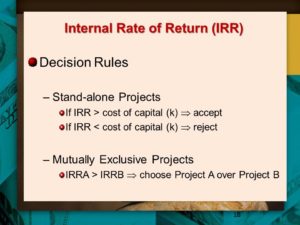I’ll be the first to admit that financial capital markets theory can be dry as dust and that mostly you should just live your best life in blissful disregard for almost all of it. Today, however, indulge me in discussing a capital markets rule that can help you avoid fraud, seek better investments, and make you a more successful entrepreneur.

A recurring and guiding principle of my financial writing is that most people could benefit a bit from “thinking like a banker,” and this is one of those ways to do that.
Here’s the finance theory: The yield, or financial return, available to you as an investor is equivalent to the cost of capital of the company offering that investment opportunity.
Huh? I know, I know. What does that even mean?
It means that if you earn 0.5 interest on your savings account at the bank, or if you get a municipal bond paying a 2 percent yield, that’s how much the bank and the municipality have to pay to use your money. That’s their cost of capital. Banks and muni bonds are pretty straightforward examples of the theory.
The theory also means that if you end up earning 8 percent per year by owning a public stock for thirty years – from a combination of dividends and price appreciation – that public company has effectively endured an 8 percent cost of capital per year throughout that time. This point is a bit more abstract, since the company might have only paid out, let’s say, 2 percent in cash dividends on the shares. But in aggregate the idea is still true, and here’s why. If the original owners of the shares, or the company itself, had never sold stock in the first place, all of that 8 percent annual investment return would be captured by the company or its original owners, not the outside stock holders. Since it wasn’t retained, that’s their cost for having sold shares thirty years ago. If you make a lot of money owning stocks, it was pretty costly for the founders who originally sold

Of the many applications for this important theory, avoiding fraud is the first to come to mind. Let’s say you’re a Texan of some means in June 2005, looking for a nice high-yielding, but safe, place to park your cash, during that low-interest rate environment. A friendly salesperson offers you a bank CD with Allen Stanford’s Stanford International Bank, with a 7.45 percent 12-month certificate, compared to the average US bank CD at the time of 2.8 percent. Great deal, no?
NO.
Stanford’s company claimed access to unusually attractive investment opportunities. But a key thought for Stanford CD investors should have been this: Why would Stanford’s company incur such a high cost of capital? As an investment rule, if the investment opportunity seems to offer far more than would be available elsewhere, your fraud-detection spidey-sense should make you ask: Why does that company need to pay so much to use my money?
On the more legitimate side of investing, the theory can be quite useful for skeptically evaluating risky things like high yield bonds or initial public offerings (IPOs). Let’s say back in 2011-2012 you were tempted to buy Greek bonds at a highly distressed 15 percent (or more) yield. That’s an amazing-seeming yield for government bonds, and such a nice place, too. They have beautiful islands! The yogurt’s incredible. What could go wrong?
A skeptical thing to remember is that the Greek government itself, if it had the cash, could purchase those bonds themselves in the open market and lock in a 15 percent return on capital through retiring their own debt. Obviously, for that whole time period, it didn’t have the cash, at all. Which is a worrisome thing if you’re contemplating owning their debt. Private bank lenders to Greece ended up taking a greater than 50 percent “haircut” on the value of their loans in 2012.
This cost of capital theory also generally makes me skeptical of IPOs, even of excellent or “hot” seeming companies. Here’s the thought process. If the current private holders of companies believe that the company they own offers a good return on capital in the future, they generally don’t look to sell shares.
 Did you figure in March 2017 that you’d make a 15 percent annual return buying the IPO for Snapchat (SNAP Inc)? Well, the skeptical thought is that the pre-IPO owners – who know infinitely more about the company than you do – wouldn’t typically give up a 15 percent annual return if that seemed likely. When founders sign up to sell their company through an IPO, I generally interpret them as saying the following: “The best days of growth for this company are probably behind us. I’d prefer to get my money out while the getting is still good. I can make more money elsewhere.”
Did you figure in March 2017 that you’d make a 15 percent annual return buying the IPO for Snapchat (SNAP Inc)? Well, the skeptical thought is that the pre-IPO owners – who know infinitely more about the company than you do – wouldn’t typically give up a 15 percent annual return if that seemed likely. When founders sign up to sell their company through an IPO, I generally interpret them as saying the following: “The best days of growth for this company are probably behind us. I’d prefer to get my money out while the getting is still good. I can make more money elsewhere.”
Now, I know that founders’ decisions are more complex than that – having to do with personal liquidity, pressure from private equity owners, and maybe a strategic need to scale up a business. But still, a factor in their decision is whether they can make a high return in the future, or whether they don’t mind some other damned fool taking that risk from here on out.
Finally, I think understanding the “investor’s return = company’s cost of capital” idea can make you a better startup entrepreneur. If you’re an entrepreneur and you truly believe in your company’s product even though it’s still in an early-stage of development, why (OH WHY?!) would you be in a rush to sell part of your business to angel investors? I know you need the money now. But if you succeed wildly in the future then the cost of that capital will be nearly infinite. If you believe in your company’s prospects, selling a piece of it is an outrageously expensive way to raise money. More founders should fight with tooth and claw to never sell equity in their company, and certainly not at an early stage.
Please see related posts:
Post read (240) times.




